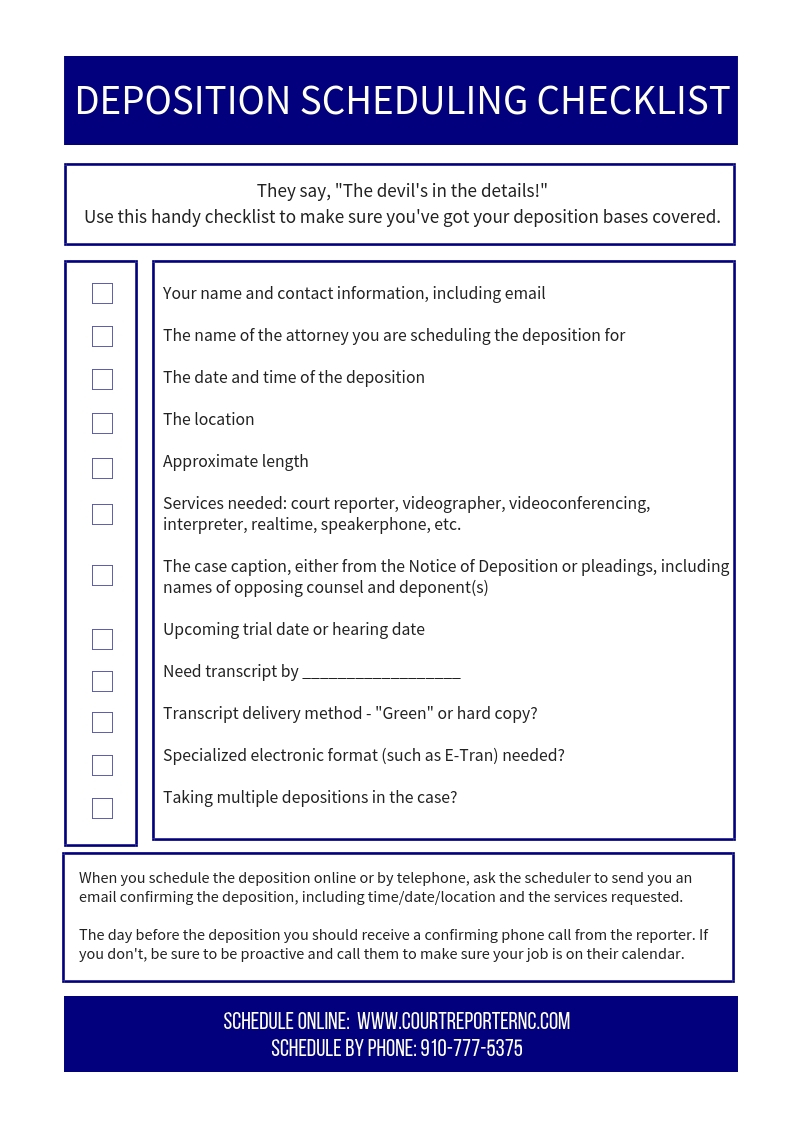Month: January 2019
The Olympics of Court Reporting

Scheduling a deposition is easy –
simply pick up the phone or send an email, right? But if your paralegal doesn’t
have all of the pertinent information, or if that information is not
communicated to the court reporting firm, you run the risk of getting into some
sticky, time-consuming, or expensive situations.
1. When and Where?
Obviously, the scheduler will need
to know the date, time, and location of the deposition or hearing. But, you
will probably also be asked what day of the week (to ensure that the day of
week and date match). In addition, if participants will be located in various
time zones, it’s helpful to list what the deposition start time is in each time
zone. For example: 12 noon Eastern, 11 a.m. Central, 10 a.m. Mountain, 9 a.m.
Pacific.
Before scheduling the deposition,
double-check the address and phone number of the location. If there is anything
unique about how to find the location (for instance, if the signage isn’t
readily visible from the road, or the building is tucked away in the back of an
office park), be sure to let them know. If the court reporter will be arriving
before the building’s regular operating hours, let them know if there are
special instructions for where to park.
2. How Long?
We understand that even the
attorneys can’t provide an accurate estimated length of the job, but they’ll
generally know ahead of time if they anticipate a deposition to last 30 minutes
or all day. The reporter will be there as long as is necessary (we’ve
definitely burned the midnight oil on a few occasions) but knowing an estimated
length will help us to assign the best reporter for the job. Our scheduling
department tracks which reporters have a transcript backlog, are leaving on
vacation soon, or have evening commitments, and these factors are taken into
consideration when scheduling.
3. Case Caption/Title
Email the reporter a copy of the
Notice of Deposition, or, if one isn’t available, a copy of a pleading or the
case caption, including the names and contact information of opposing counsel
and whom they represent. This is particularly important in a deposition taken
by video conference, so the reporter doesn’t have to go through gathering that
information from each participant at the time of the deposition.
If the case is technical or has
specialized vocabulary, emailing a copy of the pleadings ahead of time will be
a huge help for the court reporter.
4.Future Depositions
If you know you will be taking
multiple depositions in the same case, let the scheduling department know.
They’ll make every attempt to have the same reporter cover each deposition.
5.Special Services
Do you need a videographer? What
about an interpreter? Will you need a videoconference set up? Do you need to
use our conference room facilities? Be sure to let us know as soon as possible.
6.Standard or Expedited Delivery?
If you know you’ll need the
transcript sooner than our standard 10-12 business day turnaround, make sure to
let us know when you book. It’s even more crucial to let us know ahead of time
if you think (or know) you’ll need it overnight or within two or three business
days, because that will affect which reporter is assigned to cover the job.
7.Delivery mode
At NC Court
Reporter, we believe in being environmentally responsible. As such, we feature a
“Green Delivery” transcript package which includes a PDF version of
the full-size and condensed transcript (4 pages printed on one page), with
exhibits scanned, attached, and hyperlinked, and a TXT file. Hard copies of the
transcript and exhibits are available, though; please let the scheduler know if
you’ll need a hard copy (other than the original).
To schedule your next
deposition with NC Court Reporter, use our online scheduling tool or call
910-777-5375.